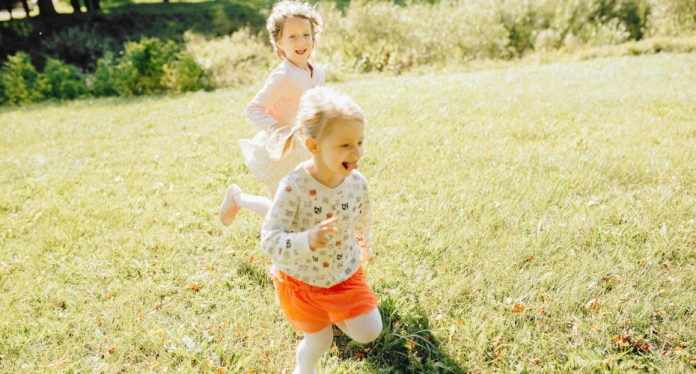The first national survey of play in preschool-aged children in Britain has found that from the age of two-years-old, girls are playing outside in nature less than boys.
The research was conducted by the University of Exeter in partnership with the University of Cambridge and published in the Journal of Physical Activity and Health. Parents of children aged two to four living in England, Scotland and Wales were surveyed and early differences in time spent in nature were found – which may have long-term implications, particularly for the health of girls. This is important because compared to boys, girls are less physically active and more likely to have difficulties with their mental health as they get older.
Professor of Child Psychology at the University of Exeter Medical School, Helen Dodd, co-led the study with funding from a UKRI Future Leaders Fellowship. She said: “Playing in nature has important physical and mental health benefits for all children. When children play outdoors in nature, they’re more likely to be active, to play in an adventurous way like climbing trees, and to connect with and learn about nature.
“Problems may arise if children have not had enough opportunity to play adventurously and to learn about managing feelings of uncertainty and anxiety in a playful way. If they’ve had enough opportunity to learn about these feelings and emotions through their play, they might be less likely to respond negatively and feel overwhelmed when faced with challenges like starting school for the first time.”
Dr Kathryn Hesketh, a Wellcome-funded postdoctoral fellow at the MRC Epidemiology Unit, University of Cambridge, who co-led the study added: “We were quite surprised by these findings – it’s concerning that at age two, we’re already seeing these differences in the time that boys and girls play outdoors in nature. Older children tend to be socialised to particular gender roles, and girls may then spend less time playing outside in nature. We didn’t expect to see this pattern as early as age two and given the link between playing outdoors and physical activity, girls may already be at a disadvantage very early in life.”
Results also showed preschool-aged children described as belonging to an ethnic minority group play less overall than children described as white, and children living in rural areas spend more time playing than those living in urban areas.
This is the first national survey of play in preschool-aged children. It’s sister study the British Children’s Play Survey was previously conducted by Professor Dodd and team in 2020 and focused on children aged five to 11 years old. That study showed a generational decline in children’s freedom to play out unsupervised and that children who spent more time playing outdoors had fewer symptoms of anxiety and depression. These results led the research team to launch an innovative new project examining whether a play improvement programme for schools can benefit children’s mental health.
The team has now partnered with Outdoor Play and Learning (OPAL) to deliver the programme at eight primary schools across the UK. Each school is assigned a special mentor to introduce more stimulating play for children during their breaks, with the opportunity to take risks in a safe environment. OPAL has worked with over 1500 schools across the country and this study is the first to evaluate how the programme affects children’s mental health.
Michael Follett, Director of OPAL, said: “We’re delighted to have partnered with the University of Exeter to add to the growing body of research that outlines the benefits of risk in play. We have seen first-hand in more than a thousand OPAL schools how allowing for excitement, exploration, and adventure at playtime is key to children’s health and wellbeing.”







